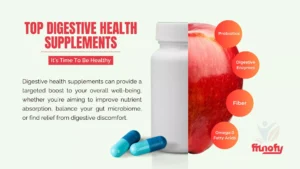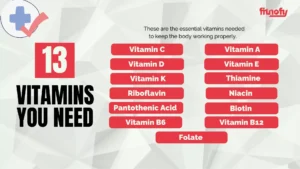Is Your Gut Healthy? Explore the Benefits of Digestive Health Supplements
For overall well being, maintaining excellent digestive health is crucial. The saying “You are what you eat” holds true, but equally important is how well your body processes and absorbs the nutrients from your food.
Digestive health supplements have gained popularity as a way to support optimal digestion and address common gastrointestinal issues.
Understanding Digestive Health Supplements
Digestive health supplements are specially created mixtures meant to boost and improve the workings of the digestive system. These supplements include a diverse range of components, such as vitamins, minerals, enzymes, and probiotics, all intended to tackle different aspects of digestion and promote good digestive health.
Benefits of Digestive Health Supplements
- Gut Microbiome Support
- Improved nutrient absorption
- Enhanced gut microbiome balance
- Relief from digestive discomfort
- Promotion of regular bowel movements
- Strengthened immune function
Essential Vitamins for Digestive Health
A well-functioning digestive system is key to overall health, and essential vitamins play a crucial role in maintaining its balance. Certain vitamins are necessary for the correct operation of your digestive system. Learn which vitamins to take and how to obtain them.
Vitamin A
Supports gut lining integrity. Found in carrots, sweet potatoes, and spinach.
Vitamin B Complex
Aids energy conversion and nerve function. Sources include whole grains, lean meats, and leafy greens.
Vitamin C
Boosts immunity and supports connective tissues in the gut. Found in citrus fruits, bell peppers, and broccoli.
Vitamin D
Reduces inflammation and supports the immune system. Found in sunlight, fatty fish, and fortified dairy.
Vitamin E
Acts as an antioxidant, aiding in gut health. Found in nuts, seeds, and vegetable oils.
Vitamin K
Supports intestinal barrier function. Sources include leafy greens and fermented foods.
Top Digestive Health Supplements
Probiotics
These live beneficial bacteria promote a balanced gut microbiome, aiding digestion, immune function, and even mental health. Look for multi-strain probiotics with billions of colony-forming units (CFUs) for optimal impact.
Choosing the right probiotic supplement depends on your needs:
Lactobacillus & Bifidobacterium:
For overall gut health and IBS management.
Saccharomyces boulardii:
Effective against diarrhea, especially after antibiotics or while traveling.
Soil-Based Organisms (SBOs):
Resilient choice to support gut health in challenging conditions.
Digestive Enzymes
These catalysts aid in breaking down nutrients, alleviating discomfort like bloating and gas. Enzyme blends containing protease, amylase, and lipase can help with protein, carbohydrate, and fat digestion.
Here are a few top enzyme supplements that can aid digestion and promote overall health:
Pancreatic Enzymes:
These enzymes mimic the body’s natural enzymes and aid in breaking down carbohydrates, fats, and proteins.
Bromelain:
Derived from pineapples, bromelain can help reduce bloating and inflammation, making it particularly useful for those with indigestion.
Papain:
Found in papayas, papain supports protein digestion and can alleviate digestive disturbances.
Fiber Supplements
Soluble and insoluble fiber contribute to regular bowel movements, preventing constipation, and promoting gut health. Psyllium husk and acacia fiber are popular choices.
Omega-3 Fatty Acids
While not exclusive to digestion, omega-3s can reduce inflammation in the gut and support overall gut health. Fish oil and algae-based supplements are common sources.
Ginger and Peppermint Extracts
Natural Herbal supplements like ginger and peppermint have been used traditionally to ease digestive discomfort, such as indigestion and bloating.
Prebiotics
These non-digestible fibers feed beneficial gut bacteria, fostering their growth and activity. Inulin and oligofructose are examples of prebiotic supplements.
L-Glutamine
An amino acid that supports the cells of the digestive tract and aids in repairing gut lining. It’s particularly beneficial for individuals with gut-related issues.
Turmeric/Curcumin
Curcumin, which has anti-inflammatory qualities, can reduce intestinal inflammation and enhance gut health.
Natural Supplements for Digestive Health
While supplements can be incredibly beneficial, some natural remedies can also contribute to better digestive health:
Ginger:
Eases digestion and soothes stomach discomfort.
Peppermint:
Relaxes GI tract muscles, aiding IBS.
Licorice Root:
Supports digestion and soothes GI issues.
Choosing and Using Supplements
Quality Assurance
Opt for supplements from reputable brands that undergo third-party testing for purity, potency, and safety.
Personalization
Consider your specific needs and consult a healthcare professional before adding supplements to your routine, especially if you have underlying health conditions.
Balanced Approach
Supplements work best when combined with a healthy lifestyle, including a nutritious diet, exercise, stress management, and adequate sleep.
Start Slowly
Introduce one supplement at a time to gauge its effects on your digestion and overall well-being.
To Sum Up
Incorporating digestive health supplements into your routine can provide a targeted boost to your overall well-being. Whether you’re aiming to improve nutrient absorption, balance your gut microbiome, or find relief from digestive discomfort, these supplements offer a convenient and effective way to support your digestive system’s vitality.
FAQs
How can I improve my digestive health fast?
To improve your digestion, prioritize staying hydrated, opt for smaller well-balanced meals, increase your fiber intake, steer clear of heavy or spicy foods, and manage stress through relaxation techniques. Additionally, consider incorporating supplements to improve digestive health, as they can further support and optimize your digestive system.
How do you treat weak digestion?
Enhance digestion by practicing mindful eating, avoiding overconsumption, considering digestive enzyme supplements, incorporating probiotics, and enjoying the benefits of ginger and peppermint teas.
How do you cure poor digestion?
Improve digestion by opting for a fiber-rich diet, practicing stress management, prioritizing hydration while reducing sugary drinks, minimizing processed and fried foods, and adopting a pattern of smaller, frequent meals.
What are the symptoms of slow digestion?
Recognize slow digestion through symptoms like bloating, gas, heartburn, feeling full rapidly, irregular bowel movements, and post-meal fatigue, prompting you to address digestive health.
How can I strengthen my digestive system naturally?
Strengthen your digestive system naturally by diversifying your diet with whole foods, staying hydrated, engaging in regular exercise, managing stress through methods like yoga or meditation, and supplementing with probiotics and fiber to support overall gut wellness.



0 Comments